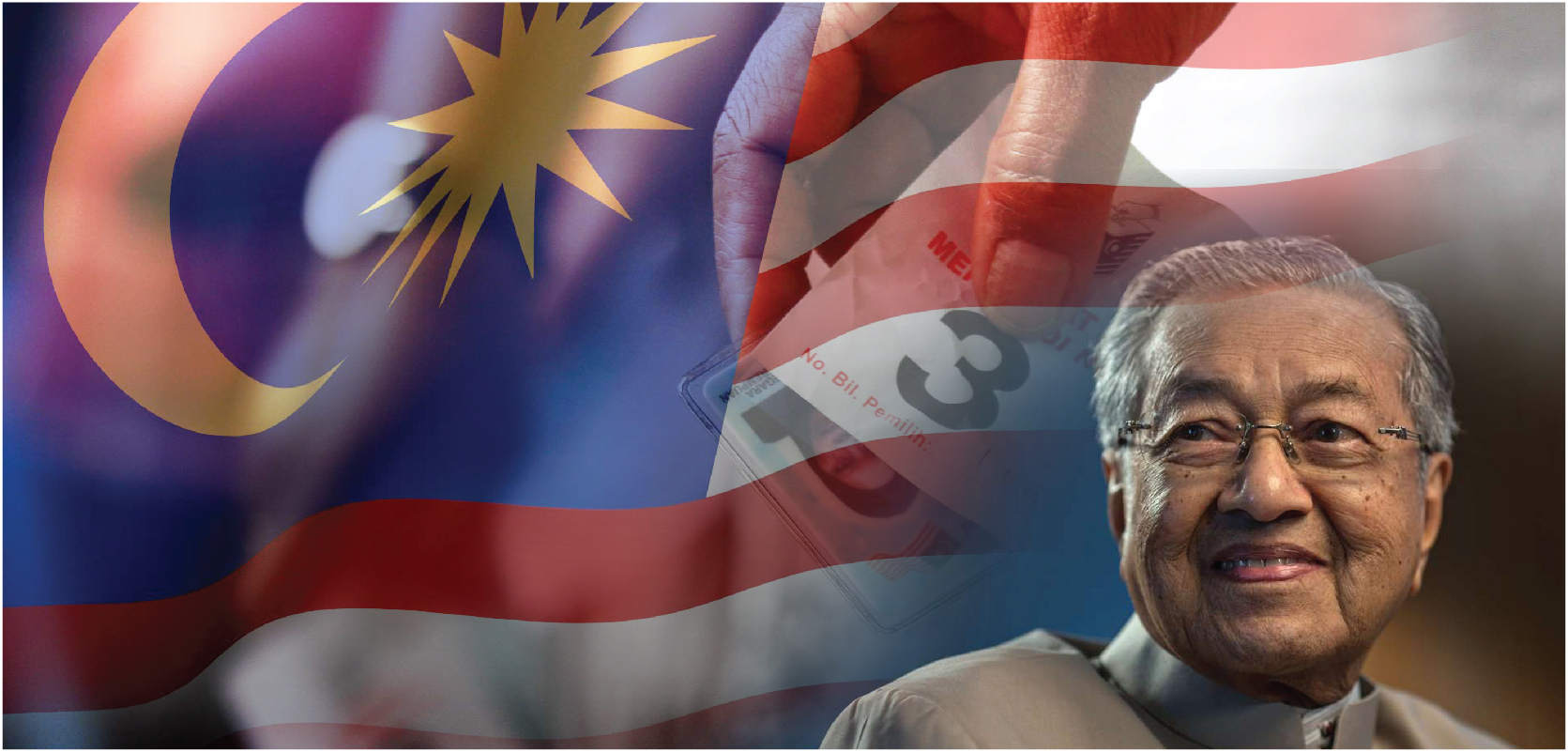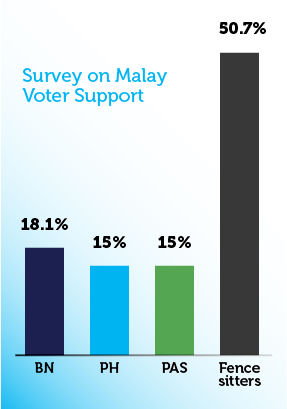
This is a fragile moment for the nation as we approach D-Day. The integrity of our democratic institutions is under assault, and basic standards of honesty and decency in public life are corroding. If you are horrified at what is happening in the lead-up to the election, you can march in the streets, and demand more from your elected representatives, you can share the latest outrageous news on your social media feed — all worthwhile activities. But none of it matters if you don’t go out and vote. With the Malaysian 14th General Elections (GE14) a matter of days away, it sometimes seems as though Malaysians have lost sight that power belongs to them and not the leaders. The intensely personal nature of this campaign – and the particular danger of the ruling coalition continuing for another 5 years–can be dangerous for the nation, all the more reason for the people to go out and vote.
Local pollsters like Merdeka Center and Politweet have been releasing results on the chances of the two main political coalitions, Barisan Nasional (BN) and Pakatan Harapan (PH), winning the coming elections. Yet predictions vary widely over how 15 million voters will choose the next government as there are key factors that could swing votes either way.
Leadership Legacy
According to The Diplomat, the first factor is the leadership legacy of Tun Mahathir Mohamad. Tun Mahathir Mohamad was recently named as the opposition coalition prime minister-designate to contest in the coming elections, pitting him against the incumbent Prime Minister Datuk Seri Najib Razak. Tun Mahathir Mohamad’s personal appeal in Kedah is a huge obstacle to the Barisan Nasional ruling coalition to retain power in the state. Kedah has been Mahathir’s political base since his early days in politics in the 1950s. Being the figure most responsible for bringing development to the state during his tenure as prime minister from 1981 to 2003, the prevailing sentiments for the former PM among Kedah locals should not be overlooked.
Prominent Identity Politics
The second important factor is prominent identity politics involving former ruling coalition leaders who are now confronting BN as influential opposition figures, following their fallouts with Prime Minister Datuk Seri Najib Razak on the 1MDB issue in 2016. Leaders like Tan Sri Dato’ Dr Muhyiddin Yassin and Datuk Seri Shafie Apdal are seeking to utilize their political bases in the northern part of Johor and the eastern part of Sabah respectively as a springboard to capture those states with their new political allies in the opposition alliance. In all, Sabah’s electoral politics display the localisation process at its best by fostering a single identity among Sabahans.
Economic Concerns
The third factor is the economic concerns of voters at the grassroots level. According to the Straits Times, surveys and strategists on both sides of the political divide have asserted that Malaysians in general tended to vote with their pockets in general elections. Despite the cost of living being the top bugbear, wealthier urbanites – who have been buying luxury cars in record numbers – are set to give their vote to the opposition coalition led by Tun Mahathir Mohamad. Meanwhile, the poorer electorate in rural areas remains staunchly behind a government that has been blamed for recent economic woes such as the spike in the cost of living and the jump in property prices due to the pouring of billions of dollars into targeted welfare programmes such as direct cash aid, subsidies for basic goods, and housing. In addition, Merdeka Centre has found that while corruption is seen as one of the two top issues by 47 per cent of the Chinese, 75 per cent of the Malays pick inflation as the main bugbear.

Waning Support
It cannot be denied that the ruling coalition’s support among the Malays has been waning in recent months because of corruption scandals that have burdened the Malays, such as the billions of ringgit in losses and debt incurred by the Federal Land Development Authority (FELDA), an agency that oversees plantations for over 1.2 million poor bumiputera families and their increasing resentment towards Prime Minister Najib Razak and his coalition. The downtrend in Malay support for BN corresponded with an increase in voters from the community who were undecided or declined to state their voting preferences.
Many of the opposition coalition supporters seem confident of a win on polling day despite the uncertainties and for good reason. Since campaigning started, ceramah after ceramah organised by Pakatan Harapan has seen unprecedented crowds not just in Selangor but in other parts of the country. People from all walks of life and creed are flocking to the ceramahs to listen to the opposition coalition’s leaders, The mood at these ceramahs are unmistakable, the rakyat is hungry for change.
Malaysians are helping other Malaysians to return home to vote, knowing that every single vote counts especially in a climate where the integrity of the Election Commission has glaringly come into question. At the grassroots, the eyes of the rakyat are slowly opening through countless corruption scandals, specifically the one involving FELDA which has hit closer to home. Urban voters are fervently hoping that Ini Kali Lah we can retire a 60-year old regime for a new coalition.
A coalition that promises to lead with fiscal integrity, transparent governance and people-centric initiatives. As Dato’ Seri Mohamed Azmin Ali says, it is time to end the 60 year old race-based politics of the Barisan Nasional government. Pakatan Harapan is a multiracial coalition that represents the ideals and vision for a progressive and prosperous Malaysia. Come May 9th, the future of all Malaysians lie in our hands. We can either do nothing or we can flood polling stations in record numbers to save Malaysia for our children. You decide.




